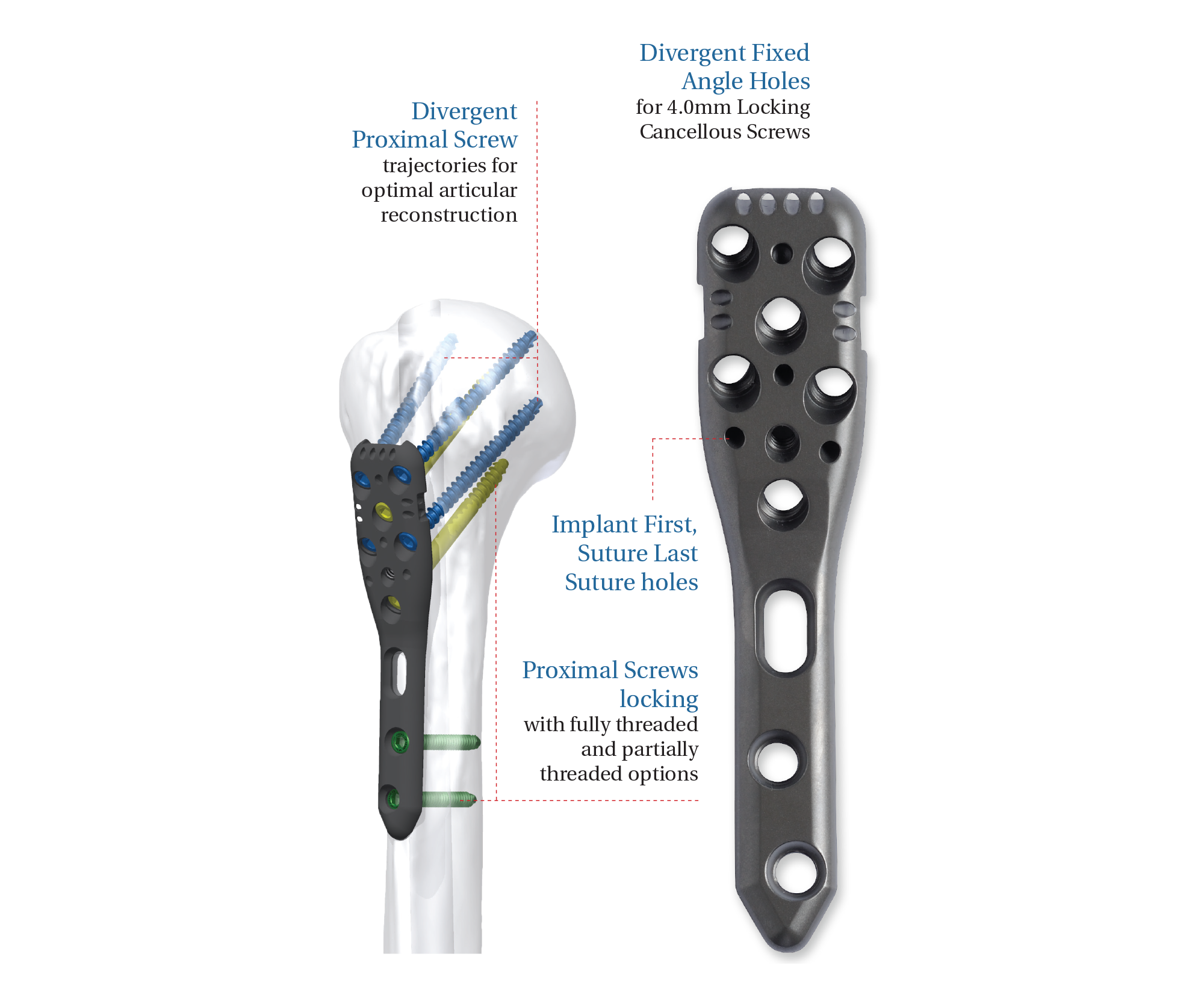Proximal Humeral Plating System
The AOS PHP is indicated for fractures, fracture dislocations, osteotomies, and non-unions of the proximal humerus. The PHP is an anatomically designed, low profile, titanium locking plate and screw system.
The ALPHA Plate and the Deltoid Insertion
One of the key design elements of the plate is to eliminate the need to cut the deltoid.
ALPHA Plate unique anatomical side specific proximal contour allows for sparing of the deltoid insertion and avoidance of dissection/soft tissue stripping at the sub-deltoid space.
Helps to avoid postoperative adhesions/stiffness, and will promote preservation of the vascular supply to the bone.
Preserves native deltoid insertion for the instance of future conversation to a reverse shoulder prosthesis.
Secondary distal contour creates an optimal structure for fractures with shaft extension. The ALPHA’s proprietary dual curvature design creates a near 90 deg opposition from proximal cluster and anterior shaft providing for superior torsional stability. (Available in longer plates only).
The secondary curvature allows for a more anterior position of the distal plate avoiding the superior flare of the lateral epicondyle of the humerus for fixation of distal fractures.
Convergent Proximal Screw Pattern allows for increased spread in the humeral head while creating an intramedullary strut to resist excessive settling or subsidence of the humeral head fragment.
Shaft suture holes to facilitate biceps tenodesis.
Implant Features: Alpha Plate
It is designed to treat periarticular or intra-articular fractures of the proximal humerus. The anatomic shape and fixed screw take into account the current demands of surgeons for appropriate fixation, fatigue strength, and minimal soft tissue damage. Locking plates provide improved stability, even in patients with poor bone quality, while reducing screw- loosening. Locking plates and screws may also help to reduce the risk of avascular necrosis as the locking plate does not need compressive contact with the bone in order to maintain fracture reduction.
The Plate is available in a distal fitting, limited impingement 130° configuration or a more proximal fracture buttressing 95° construct. Five plate lengths are offered, ranging from 3-14 hole constructs. The system features 4 mm Cancellous Locking Screws in the proximal cluster and 3.5 mm Locking or Non-locking Cortical Screws for distal fixation in the shaft.
Proximal Humeral Plate
Implant Features: Proximal Humeral Plate
95° Plate
95° Proximal fitting option to help buttress the greater tuberosity and higher transverse fracture -patterns.
FEATURES & BENEFITS
Low profile plate and screws
130 ° Distal fitting option to significantly decrease the risk of sub acromial impingement
Proximal Screws locking screws with fully threaded and partially threaded options
Double-lead, screw thread design allows screws to maintain directional alignment upon insertion and reduces cross threading
Limited contact plate design: reduces plate to bone contact, limiting vascular trauma and insult to bone
Low profile aiming blocks for easier targeting
Divergent Proximal Screw trajectories for optimal articular reconstruction
Offset Proximal Screws for improved A/P radiographic visibility
Locking or Non-Locking Shaft Screws
Angled Proximal Suture Holes to facilitate rotator cuff repair
Place First, Suture Last Suture holes: Sutures can be attached after plate fixation to limit interference during plate and screw placement
Angled Shaft Suture Holes to facilitate deltoid attachment (8, 11, 14 hole plates only).
3 plates options available in one comprehensive system










